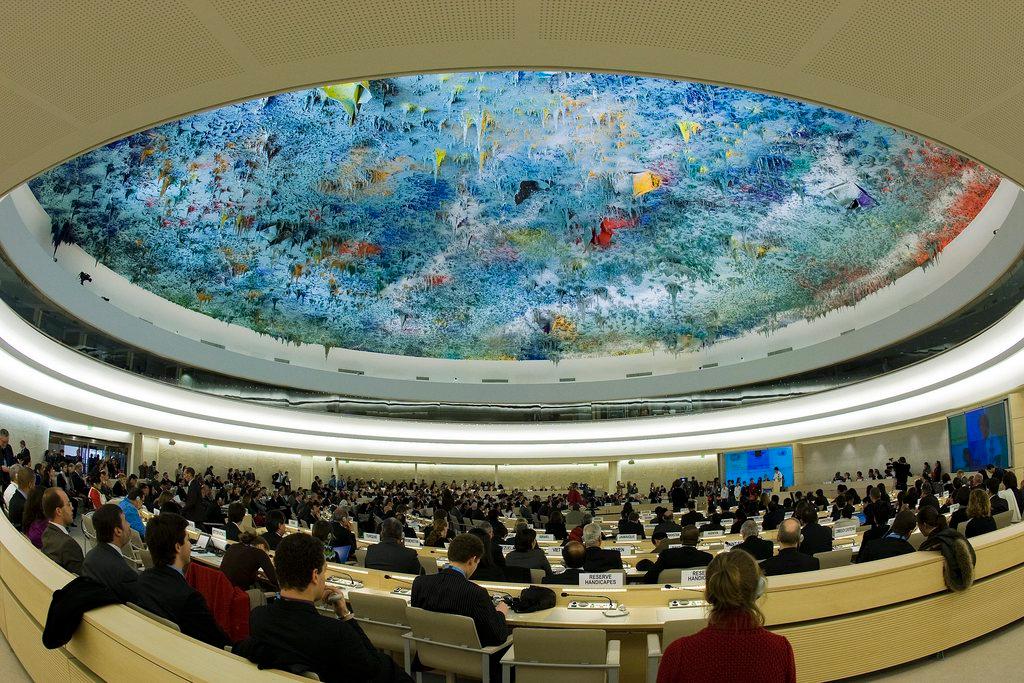
Switzerland urged to improve discrimination record

Switzerland has been defending its human rights record before the Geneva-based United Nations Human Rights Council. States welcomed Swiss progress since its last Universal Periodic Review (UPR) in 2012 but urged greater efforts to fight discrimination and to improve the integration of migrants.
On Thursday, Pascale Baeriswyl, State Secretary at the Foreign MinistryExternal link, and a dozen-strong delegation defended Switzerland’s national human rights record for the third time before the UN council in a peer review process known as UPRExternal link.
At the opening of a so-called ‘interactive dialogueExternal link’ session with member states, Baeriswyl External linkunderlined Switzerland’s high respect for human rights, while acknowledging that ‘no country can be complacent’, as protecting human rights is a ‘never-ending task’.
During UPR28, CH reacts to recommendations on #NHRIExternal link, racial discrimination, rights of migrants, gender equality, #SOGIExternal link, child rights. #UPR28External link @UNGenevaExternal link pic.twitter.com/Ku3cj4fPWoExternal link
— SwitzerlandUN (@swiss_un) 9 novembre 2017External link
For their part, several states said Switzerland should make greater efforts to combat racism, stop violence against women and better protect migrant workers.
Others welcomed a draft bill aimed at establishing a national human rights institutionExternal link, while stressing the need for it to remain independent. Baeriswyl said the institution should be in place by 2020, if parliament agrees.
Several countries, however, criticised Switzerland for not having ratified the Council of Europe Convention on Preventing and Combating Violence against Women and Domestic Violence (known as the Istanbul Convention). Baeriswyl said the process was ‘ongoing’.
Others repeated their demands for Switzerland to sign the International Convention on the Protection of the Rights of All Migrant Workers and Members of Their Families. Baeriswyl said Switzerland, like several other OECD states, does not intend to sign up the convention.
Dommage, la Suisse se glorifie devant le #UPR28External link de son plan d'action national sur la responsabilité des entreprises, alors que ce plan refuse des mesures contraignantes qui obligeraient les multinationales basées en Suisse à respecter les droits humains et l'environnement.
— Manon Schick (@ManonSchick) 9 novembre 2017External link
Manon Schick, the director of the Swiss branch of Amnesty InternationalExternal link, who was present in Geneva, said she was struck by how many states praised Switzerland for human rights measures it had introduced, including the ratification of certain treaties.
“But these same states also pointed out the real problems in the country, namely wage inequality between men and women, domestic violence, racial discrimination and hate speech, not to mention the creation of a truly independent national human rights institution in accordance with the Paris Principles (which set the framework for such an institution),” said Schick.
“The main interest of this kind of [peer review] examination lies in its preparation and follow-up. In drafting its report submitted today, the government has consulted with civil society organizations who themselves have coordinated to raise their own concerns.”
UNIVERSAL PERIODIC REVIEW (UPR)
The first four-year review exercise of all 193 UN member states began in April 2008. The records of states are examined using a common mechanism, regardless of their size, wealth, military or political importance.
The UPR cycle takes place roughly every four years. Switzerland’s first and second reviews took place in May 2008 and October 2012, respectively. The third reviewExternal link began on November 9, 2017.
Before each appearance the state under review submits a national report spelling out the steps they have taken to implement accepted recommendations from the first review. This is complemented with a UN report and summary of stakeholder information (NGOs, etc).
The review is facilitated by groups comprising of three members of the council, or troikas, which act as rapporteurs. Slovenia, the Philippines and Ghana will supervise the Swiss presentation.
During the session, an interactive dialogue between the country under review and the council takes place and later a working report is adopted for each country.
The UPR working group will adopt recommendations to Switzerland on November 14. The Swiss authorities will then evaluate what can realistically be implemented; there will then be a consultation period with the cantons, NGOs and public debates.
Translated from French by Simon Bradley

In compliance with the JTI standards
More: SWI swissinfo.ch certified by the Journalism Trust Initiative


























You can find an overview of ongoing debates with our journalists here . Please join us!
If you want to start a conversation about a topic raised in this article or want to report factual errors, email us at english@swissinfo.ch.